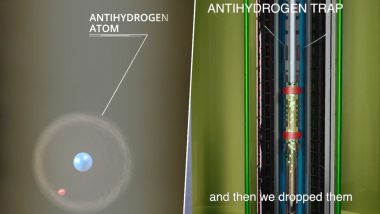Washington, September 28: In a groundbreaking discovery, scientists at CERN have observed antimatter particles reacting to gravity in a manner similar to visible matter, challenging prior speculations about the behaviour of antimatter. For the first time ever, researchers at the European physics lab CERN have witnessed antimatter particles defying expectations by falling downward due to the influence of gravity.
This observation has affirmed Albert Einstein's 1915 theory of relativity, dispelling previous conjectures that antimatter might be repelled by gravity, a notion that would have revolutionised our understanding of the cosmos.
The Antimatter Mystery
The universe, as we know it, consists of both matter and antimatter, born from the cataclysmic event of the Big Bang. However, there is a conspicuous absence of antimatter in the observable universe, posing a perplexing question: What happened to all the antimatter? According to Jeffrey Hangst from CERN's ALPHA collaboration, "Half the universe is missing," and the reason behind this disparity remains one of the most significant enigmas in physics. Swedish Research Rocket Veers Off Its Planned Course, Lands in Norway; Esrange Space Center Launches Probe Into Incident.
Antimatter Particles Fall Downward Due to Gravity
What happens if you drop an anti-apple?
In a paper published today in @Nature, the ALPHA collaboration at CERN’s Antimatter Factory shows that, within the precision of their experiment, atoms of antihydrogen – a positron orbiting an antiproton – fall to Earth in the same way as… pic.twitter.com/oo83GbZT2Z
— CERN (@CERN) September 27, 2023
Challenging Antimatter Assumptions: Gravity's Role
According to multiple reports, one of the longstanding questions in physics pertained to how antimatter interacts with gravity. While many physicists believed that antimatter should behave like ordinary matter in response to gravity, some had speculated otherwise. To address this question, scientists at CERN embarked on a complex experiment that involved creating, trapping, and studying antihydrogen particles, a form of antimatter. Mystery Brain Disease Strikes in Canada: Cluster of Mysterious Brain Diseases Detected in New Brunswick, Victims Develop Dementia-Like Symptoms, Says Report.
Antimatter in a Magnetic Bottle: The Experiment
The researchers employed a magnetic bottle with adjustable fields at both ends to trap antihydrogen particles. By reducing the magnetic field's strength, they allowed the antihydrogen particles to escape. Surprisingly, around 80% of the antihydrogen particles fell downward, akin to regular matter, indicating that gravity exerts the same pull on antimatter as it does on ordinary matter.
What Lies Ahead
While this groundbreaking experiment confirms that antimatter responds to gravity in a familiar manner, it does not completely elucidate whether antimatter behaves identically to matter. Further research will focus on discerning any nuanced differences in their gravitational responses. Scientists remain committed to solving the mystery of why the universe predominantly comprises matter while antimatter appears to have vanished.
Additional experiments, including those at CERN's Large Hadron Collider and on the International Space Station, aim to shed light on the scarcity of antimatter and potentially unveil new facets of physics. The persistence of this cosmic riddle underscores the profound mysteries yet to be unravelled in the universe.
(The above story first appeared on LatestLY on Sep 28, 2023 11:19 AM IST. For more news and updates on politics, world, sports, entertainment and lifestyle, log on to our website latestly.com).













 Quickly
Quickly












